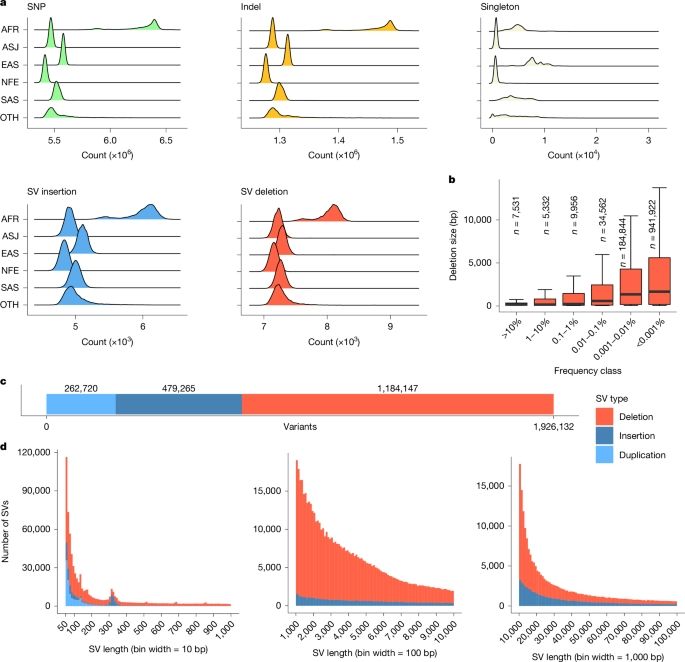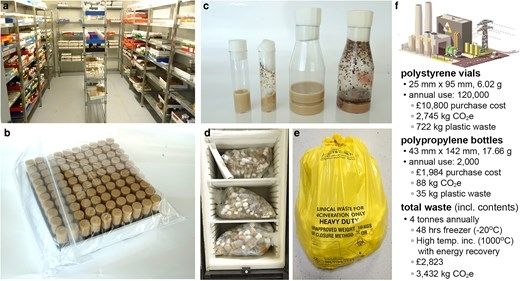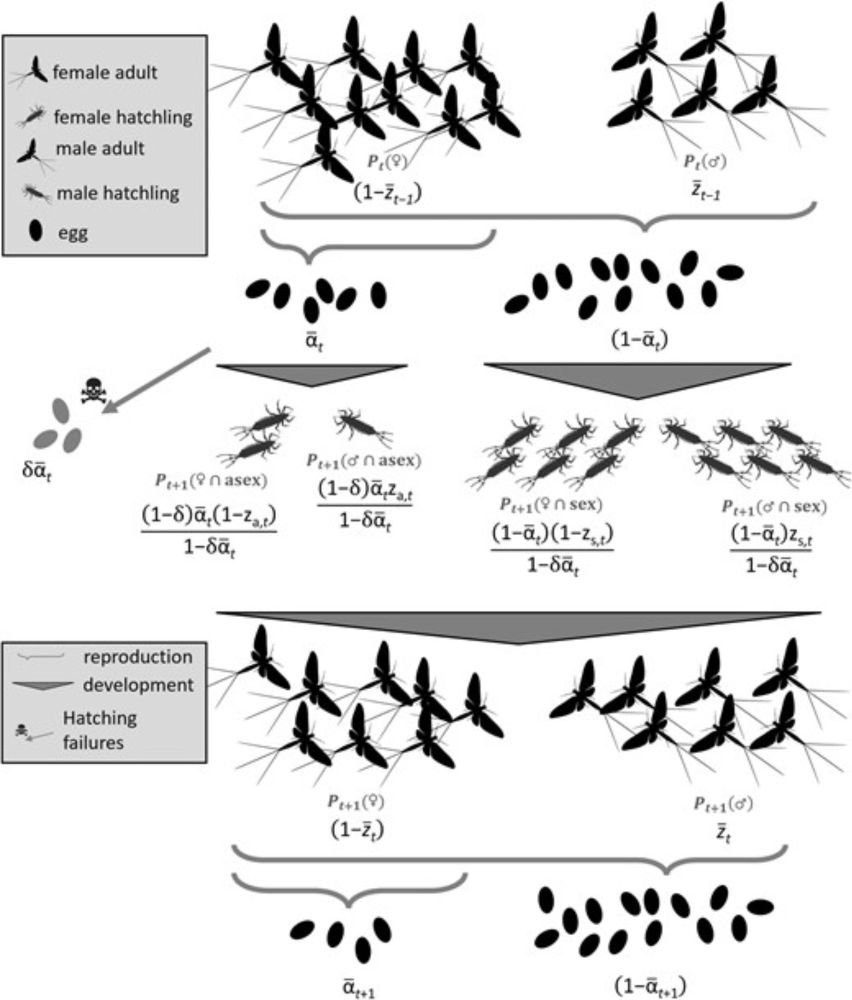Exciting PostDoc and RA opportunity with two lovely supervisors!
26.09.2025 13:45 — 👍 1 🔁 1 💬 0 📌 0
If you work on the internal conflicts, do consider proposing a paper for our upcoming special issue in the Journal of Evolutionary Biology.
More info here: internalconflictsstn.wordpress.com/special-issue/
29.08.2025 14:35 — 👍 6 🔁 6 💬 0 📌 0

We’re offering a fully funded 4 yr PhD position to work on Sexual selection in complex environments at the @uv.es. Co-supervised by @dbergerbiol.bsky.social. Find details below 👇
01.09.2025 13:25 — 👍 31 🔁 57 💬 0 📌 2

debugging some slim code, and these flashing haplotypes are mostly gratuitous, but the closest I'll ever get to the matrix I think
22.08.2025 03:57 — 👍 12 🔁 1 💬 1 📌 0
Har du rotter på loftet, det er superfantastisk
21.08.2025 11:35 — 👍 1 🔁 0 💬 0 📌 0

Multiplexing gene drives have high homing efficiencies
Excited to be a part of this new paper with Alphey Lab- out in pre-print.
Multiplexing overrides resistance for #genedrive in Anopheles stephensi
www.biorxiv.org/content/10.1...
21.08.2025 08:46 — 👍 6 🔁 3 💬 0 📌 0
Postdoc opportunity in disease ecology at @uniexecec.bsky.social with the excellent @btschirren.bsky.social and @andyyoung.bsky.social in evergreen Cornwall UK.
21.08.2025 08:01 — 👍 6 🔁 9 💬 0 📌 0
I just got the notice that all the FlyBase people at Harvard, including me, will be laid off on October 12. I'm devastated.
11.08.2025 18:12 — 👍 379 🔁 224 💬 65 📌 50
Come work with my amazing new colleague!
11.08.2025 14:50 — 👍 6 🔁 2 💬 0 📌 0
Postdoctoral Position (f/m/d) at the Chair of Behavioral Physiology & Sociobiology
Biocenter of the University of Würzburg Am Hubland 97074 Würzburg
We are looking for a Postdoc (up to 5 years) who wants to study neural mechanisms of spatial memory in honeybees.
This includes tetrode recordings in behaving honeybees.
Application Deadline is 1st of October 2025.
More details:
www.biozentrum.uni-wuerzburg.de/en/services/...
01.08.2025 08:44 — 👍 49 🔁 42 💬 1 📌 5
Job Search
Two (!) ongoing Academic (Research and Teaching) positions in Ecology, here at Monash University in Melbourne. Closing in a little over a week! Please share widely! Both at Lecturer/Senior Lecturer level (similar to Assistant Professor) careers.pageuppeople.com/513/cw/en/jo...
28.07.2025 23:32 — 👍 24 🔁 38 💬 0 📌 0
Job Search
An ongoing Academic (Research and Teaching) position in Genomics, here at Monash University in Melbourne. Closing in a little over a week! Please share widely! Lecturer/Senior Lecturer level (similar to Assistant Professor). careers.pageuppeople.com/513/cw/en/jo...
28.07.2025 23:33 — 👍 6 🔁 15 💬 0 📌 0
The 1st author is here too: follow @tom-is-kean.bsky.social ! His clever idea was to highlight similarities between meiotic drive and inbreeding's "automatic transmission advantage". We ask: given structurally identical(ish) problems, why is what is viewed as paradoxical so different between fields?
22.07.2025 14:42 — 👍 16 🔁 5 💬 0 📌 0
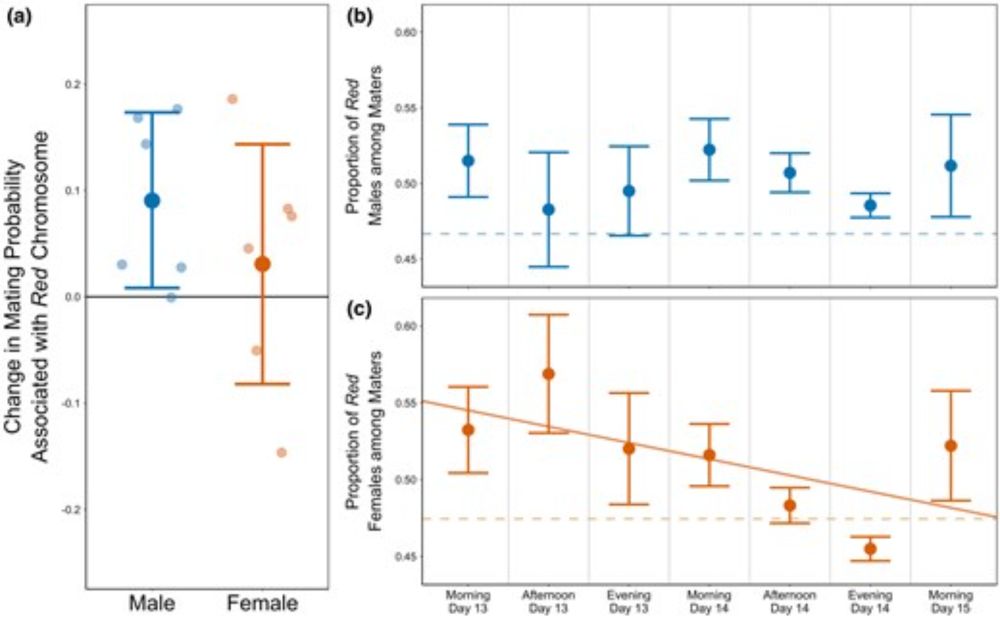
Expression Divergence in Response to Sex-biased Selection
Abstract. It remains debated whether greater degrees of sexual dimorphism would evolve if not for intersexual genetic constraints. Here, we used experiment
Out now in @molbioevol.bsky.social with Michelle Liu (co-first), Ryan Frost, Matthew Lindsay, Malak Bayoumi, Martin Brengdahl, @ruxmolnar.bsky.social and @aneil-agrawal.bsky.social, we evolved ~40% of the D. melanogaster genome under male-limited inheritance, ...
academic.oup.com/mbe/article/...
09.07.2025 15:10 — 👍 22 🔁 13 💬 2 📌 1
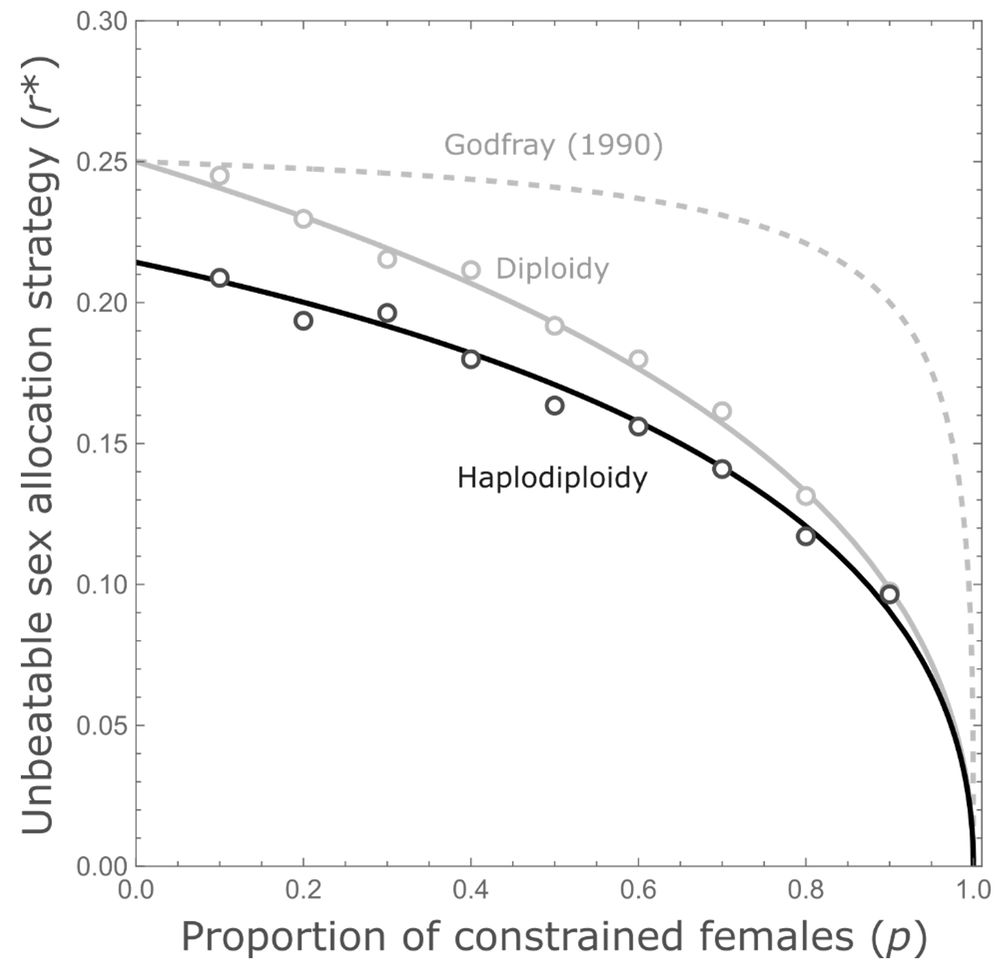
Figure 1. Unbeatable sex allocation strategy of unconstrained females (r*) as a function of proportion of constrained females (p) under local mate competition with two foundresses colonising the patch. Shown are the result for Godfray’s (1990) erroneous diploidy solution (dashed grey line), our corrected diploidy solution (solid grey line), and our haplodiploidy solution (solid black line). Overlaid are results from individual-based simulations (discs).
New paper: "The consequences of constrained sex allocation in diploids and haplodiploids under local mate competition", with Chedhawat Chokechaipaisarn:
doi.org/10.1093/jeb/...
@jevbio.bsky.social
09.07.2025 08:30 — 👍 19 🔁 7 💬 0 📌 0
A new paper by my academic grandchild @ewanflintham.bsky.social, now out in @jevbio.bsky.social:
08.07.2025 10:40 — 👍 5 🔁 2 💬 0 📌 0
I probably won't have time to make a video out of this.
But the materials are available online, and should be pretty self-explanatory.
Hope this is useful to some people.
privefl.github.io/statgen-cour...
04.07.2025 15:27 — 👍 29 🔁 11 💬 1 📌 0
That's why I am helping the European Society for Evolutionary Biology @eseb.bsky.social organise a hub conference in 2027 instead of a regular 1 site congress. 4 hubs across Europe so most can travel by train/bus and still meet colleagues in person (website at eseb 2027.org live in August)
28.06.2025 06:54 — 👍 32 🔁 5 💬 3 📌 0
#Evol2025 was for me maybe the most important meeting I have ever been to. My science will be drastically improved by my interactions over the past week. It was bittersweet due to the current situation and the people who weren't there, but I'm optimistic that we are strong enough to overcome this.
26.06.2025 03:06 — 👍 73 🔁 6 💬 1 📌 0
Long running project in the ant community finally out!
26.06.2025 07:12 — 👍 20 🔁 7 💬 3 📌 0
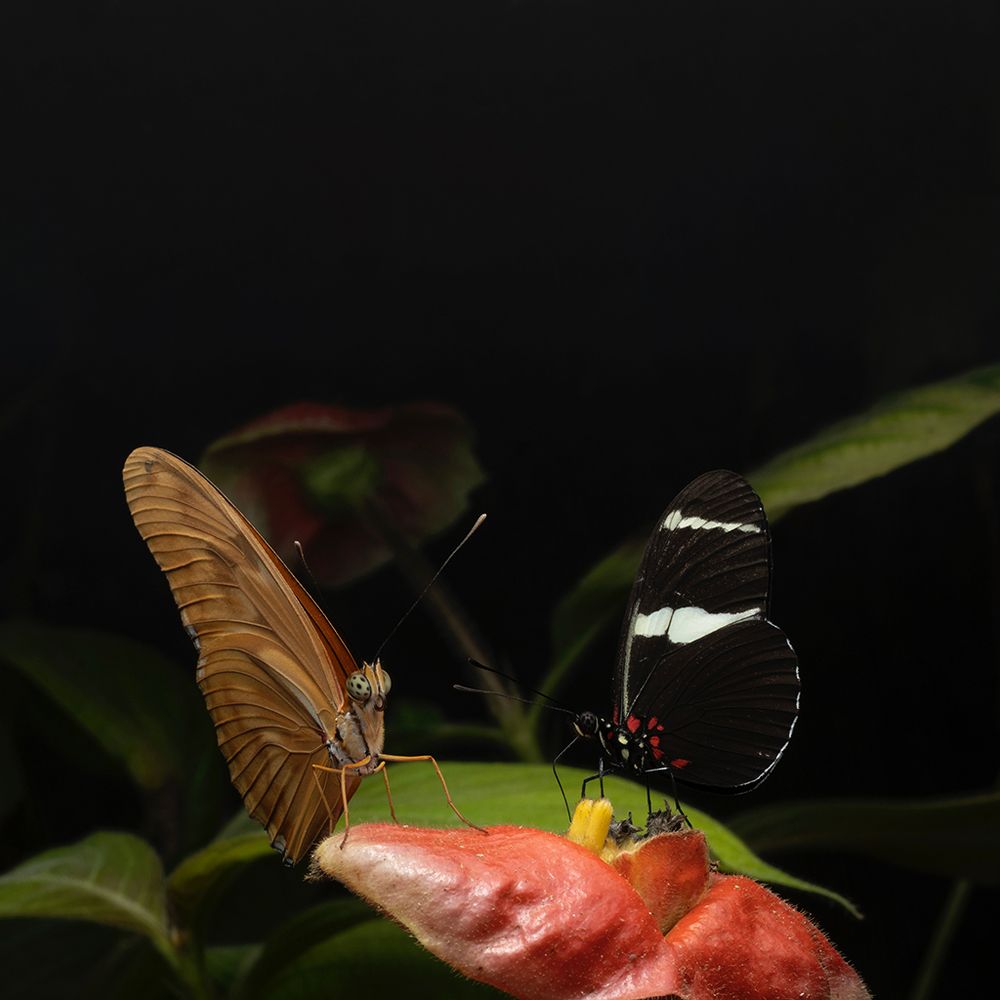
Philosophical Transactions of the Royal Society B: Biological Sciences: Vol 380, No 1929
Selection Shapes Diverse Animal Minds: our special issue of @royalsocietypublishing.org Phil Trans B on the diverse evolutionary processes underlying cognitive evolution is out today. Thanks to all our contributors! royalsocietypublishing.org/toc/rstb/202...
26.06.2025 07:52 — 👍 50 🔁 31 💬 0 📌 3
The three academic positions (Lecturer/Senior Lecturer) in the School of Biological Sciences at Monash University are now advertised. Details here:
Ecology:
careers.pageuppeople.com/513/cw/en/jo...
Genomics:
careers.pageuppeople.com/513/cw/en/jo...
26.06.2025 08:01 — 👍 39 🔁 54 💬 0 📌 3
Congrats to @emilyroycroft.bsky.social on receiving this year's Theodosius Dobzhansky Prize. Fantastic work! #Evol2025
21.06.2025 21:23 — 👍 22 🔁 2 💬 2 📌 0
So NERC have quietly announced this afternoon that they're delaying/cancelling/suspending, whatever 'not launched at this time' means, their 2025 Independent Research Fellowship round. After announcing it 34 days ago.
Flip-flopping like this is really detrimental to early career researchers.
17.06.2025 15:54 — 👍 17 🔁 9 💬 2 📌 1
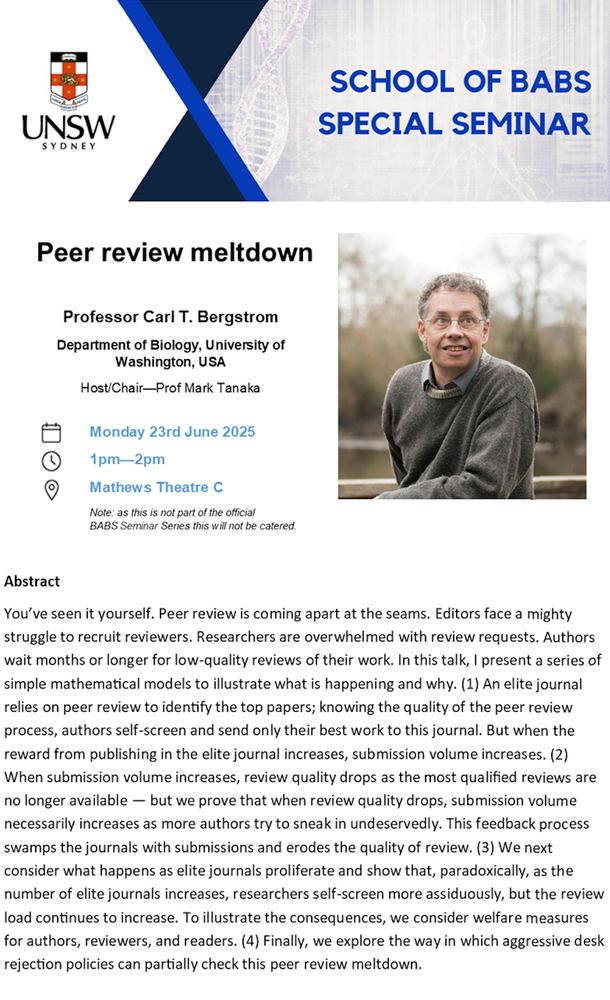
UNSW School of BABS Special Seminar
Peer review meltdown
Carl T. Bergstrom, University of Washington
Host/Chair Prof Mark Tanaka
Monday 23 June 2025
1pm-2pm
Mathews Theatre C
You’ve seen it yourself. Peer review is coming apart at the seams. Editors face a mighty struggle to recruit reviewers. Researchers are overwhelmed with review requests. Authors wait months or longer for low-quality reviews of their work. In this talk, I present a series of simple mathematical models to illustrate what is happening and why. (1) An elite journal relies on peer review to identify the top papers; knowing the quality of the peer review process, authors self-screen and send only their best work to this journal. But when the reward from publishing in the elite journal increases, submission volume increases. (2) When submission volume increases, review quality drops as the most qualified reviews are no longer available — but we prove that when review quality drops, submission volume necessarily increases as more authors try to sneak in undeservedly. This feedback process swamps the journals with submissions and erodes the quality of review. (3) We next consider what happens as elite journals proliferate and show that, paradoxically, as the number of elite journals increases, researchers self-screen more assiduously, but the review load continues to increase. To illustrate the consequences, we consider welfare measures for authors, reviewers, and readers. (4) Finally, we explore the way in which aggressive desk rejection policies can partially check this peer review meltdown.
Australian friends!
I'm going to be visiting Sydney in just over a week. I'll be at UNSW on June 23-25th and Macquarie on June 26-27th.
I'd love to catch up with people in person, and also will be giving (at least) two talks at UNSW.
The first is science-of-science modeling talk, on June 23:
13.06.2025 04:47 — 👍 125 🔁 25 💬 10 📌 1
research software, ecology, public health, open science
Research Fellow at The Kids Research Institute, Australia and University of Western Australia
she/her
European Drosophila Population Genomics Consortium brings together scientists and laboratories interested in #Drosophila evolutionary #genetics and #genomics
Studying why and how behavior evolves, from mosquitoes to mole-rats | Postdoc/Leon Levy Scholar @Columbia working with Ishmail Abdus-Saboor | PhD @Princeton with Lindy McBride | 麻布/東大 alum 🇯🇵 | yukihaba.github.io
Postdoc at Station Biologique de Roscoff. Theory on evolution of sex and life cycles.
Evolutionary ecologist at Stockholm University Zoology. Interested in how biotic and abiotic interactions influence the evolution of reproductive strategies.
Evolutionary genetics PI and professional reinventor of wheels @biouea.bsky.social @uniofeastanglia.bsky.social. #firstgen 🇺🇸 ➡️ 🇸🇪 ➡️ 🇨🇦 ➡️ 🇺🇸 ➡️ 🇬🇧 | He/him | Posts are mine.
grieshoplab.com
Molecular Ecologist at the UK Centre for Ecology & Hydrology (UKCEH)
Freshwater microbial ecology & ancient sedDNA 🧬
Evolutionary ecologist, entomologist. Interested in sexual selection, nongenetic inheritance, chemical signalling, and life in general!
Evolutionary biologist / Herpetologist / Wildlife Photographer. 🇨🇱🇦🇺. Head of Biodiversity Evolution Lab, University of Wollongong.
www.desquerre.com
Behavioural ecologist, evolutionary biologist, bioacoustician.... Plus a parent, soccer player and gamer, and curious human being.
Evolutionary Biology. Adaptation Genomics. Transposable Elements. Drosophila. @IBB_Botanic @CSIC @eseb_org Vice President @Dros_EU @LCATMon #melanogasterCTF #ERCgrantee
Lab web: gonzalezlab.eu
Science outreach: www.melanogaster.eu
DrosEU: www.droseu.net
Behavioural & evolutionary ecologist | PhD | Interested in animal communication, evolution of bird' traits on islands, bird cognition, avian female colours and song.
She/her
www.islandbirdproject.com
Research findings and news from a long-term study of Red Deer on the Isle of Rum National Nature Reserve, Scotland. https://rumdeer.bio.ed.ac.uk/ #isleofrum #deer #reddeer #cervuselaphus #science #reddeerresearch
Evolutionary ecologist working on, amongst other things, mating systems and adaptation. Knows enough stats to be dangerous and inflicts R on the innocent. Takes photos of animals. Also running/triathlon/technical diving.
Evolutionary biologist, interested in the origins of biodiversity. Mostly research the evolutionary ecology of symbiotic interactions. Professor at U.of Liverpool, UK. Born at 332ppm.
GET MY T-SHIRTS HOODYS MUGS AT https://dashare.zone -
DAILY EXTRAS BY EMAIL AT https://patreon.com/dasharez0ne
WHERE U WILL ALSO FIND "DA SHARE Z1NE", STICKERS AND MORE SHYT -DASHARE.ZONE ADMIN
Evolutionary biologist at UMR 6553 ECOBIO, @cnrs.fr / @rennesuniv.bsky.social Brittany, France. Research interests seemingly begin with s: sexual selection, sperm competition, seminal fluid, spermatogenesis, sex allocation, selfing and stress
JBS Haldane Professor of Genetics, University College of London
Associate professor in Biology @stfxuniversity
evolutionary biologist. behavioural entomologist 🇨🇦🇬🇧🇨🇦




